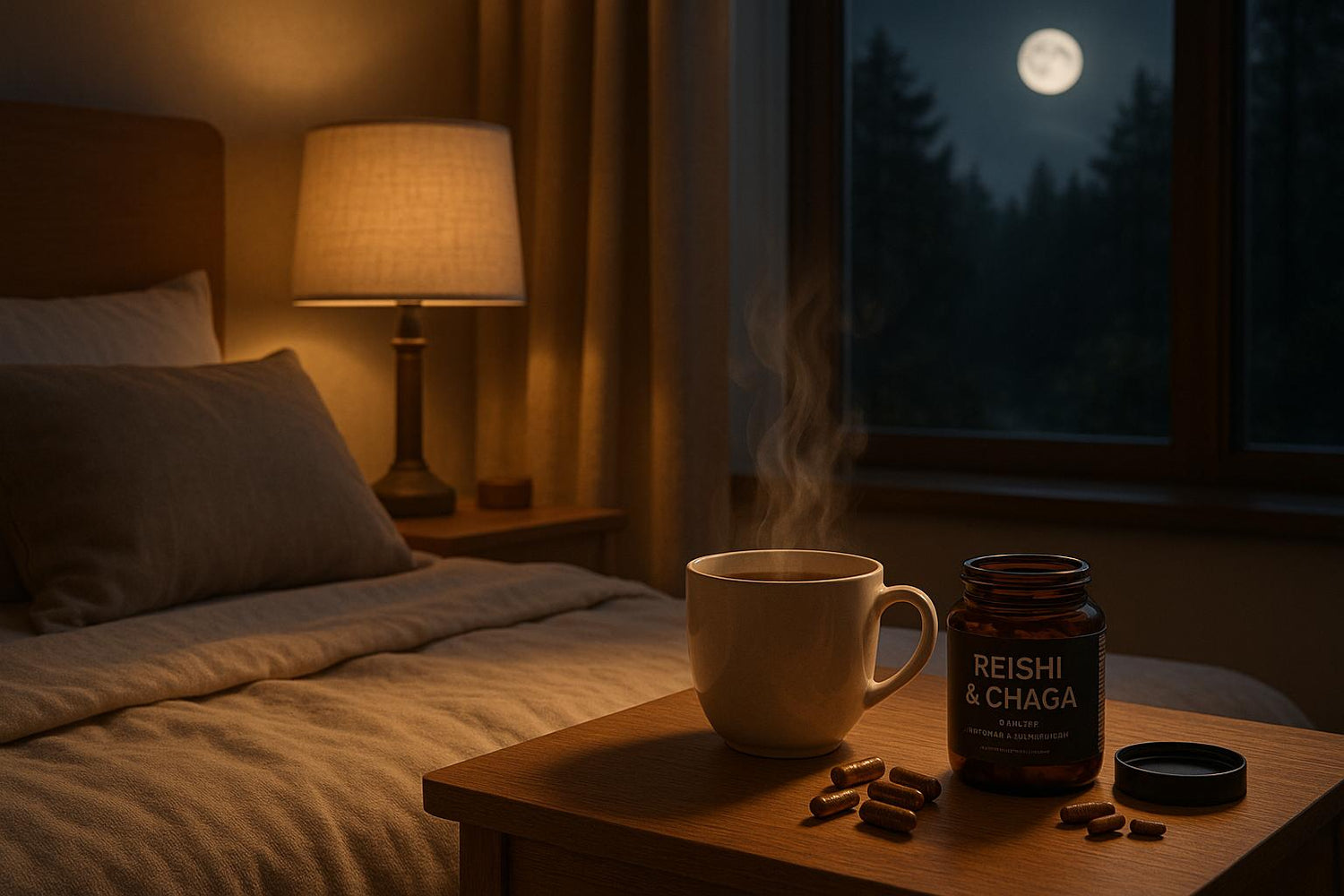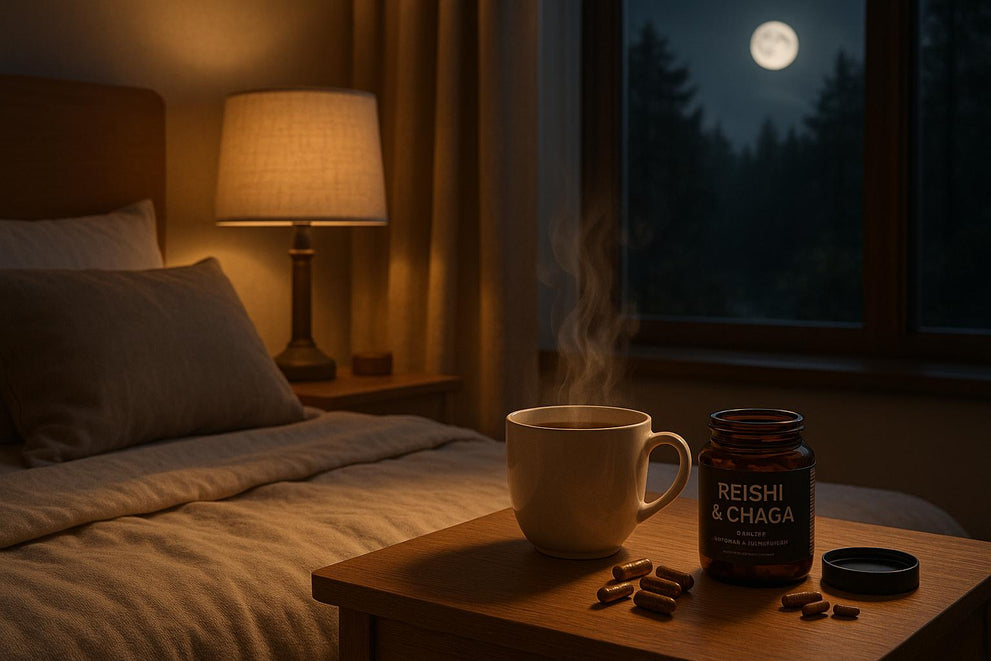Functional mushrooms like Reishi and Chaga can naturally support better sleep when taken at the right time. Reishi promotes relaxation and deeper sleep, while Chaga strengthens immune function, indirectly aiding rest. Timing matters - take Reishi 30–60 minutes before bed to align with your body’s rhythms, and pair it with calming activities like reading or meditation. Consistency is key for long-term benefits, and starting with a small dose helps you adjust. These mushrooms offer a natural way to improve sleep without grogginess the next morning.
Mushrooms For Sleep? (Top 3 Types and Why They Help)
Best Functional Mushrooms for Deep Sleep
When it comes to functional mushrooms and sleep, not all varieties serve the same purpose. Some are better suited for boosting daytime energy, while others are prized for their calming effects, making them perfect for winding down in the evening. Let’s explore two standout mushrooms known for their ability to promote restful sleep.
Reishi: Nature's Sleep Ally
Reishi has earned its place as a go-to natural sleep aid. Celebrated for its calming and sedative effects, this mushroom works in harmony with your body to encourage relaxation and deeper sleep.
Take Rob, for example. He swapped out his regular over-the-counter sleep aids for a Reishi blend and noticed a significant difference - calmness within an hour and consistent, restful sleep each night. Similarly, Yemi shared that Reishi tablets helped reduce sleepless nights and improved her ability to wake up feeling refreshed.
If you’re considering adding Reishi to your routine, it’s always a good idea to consult a healthcare professional first.
Chaga: Immune Support for Better Sleep
While Reishi focuses on calming the mind, Chaga takes a different route. This mushroom supports the body’s nighttime repair processes by boosting the immune system. Thanks to its beta-glucan content, Chaga helps regulate cytokine production, enhancing immune communication. With the highest ORAC score among superfoods, its powerful antioxidants combat oxidative stress, which may indirectly support better sleep and overall health .
Chaga also helps manage stress and inflammation, and its benefits tend to build with regular use over a month. Incorporating Chaga into your evening routine - whether as tea, powder, or extract - can support your immune system while promoting a sense of calm. Its bioactive compounds, such as polysaccharides and triterpenes, are thought to assist in regulating melatonin production, adding another layer of support for quality sleep.
For the best results, consider pairing Chaga with a relaxing nighttime ritual, like sipping it in a warm beverage before bed. And, as with any supplement, consult a healthcare professional before use .
Timing Functional Mushrooms for Better Sleep
Getting the most out of functional mushrooms for sleep means syncing their use with your body's natural rhythm. Timing plays a crucial role in maximizing their calming effects.
When to Take Functional Mushrooms
Reishi is often regarded as the go-to mushroom for sleep support, and timing its intake properly can make all the difference. Experts recommend taking Reishi about 30–60 minutes before bed, giving it enough time to work its relaxing magic.
"Reishi is like a deep breath for your body, helping you relax, manage stress, and enjoy a restful sleep." – us.dirteaworld.com
Consistency is key when incorporating Reishi into your routine. Taking it at the same time each night helps your body adapt and enhances its sleep-promoting properties over time. Whether you prefer taking it shortly before bed or with your evening meal, sticking to a regular schedule is essential for optimal results.
Once you’ve nailed down the timing, it’s worth exploring other factors that could influence how your body absorbs and responds to these mushrooms.
Factors That Affect Timing
While timing is important, individual habits and physiology also play a role in how effective functional mushrooms are for sleep. Everyone’s body reacts differently, so paying attention to your unique needs and making adjustments is crucial.
- Meal Timing: Taking Reishi with food can slow down its absorption. If you pair it with dinner, consider taking it a bit earlier to ensure its effects kick in by bedtime.
- Sleep Patterns: Your natural sleep-wake cycle matters. Early risers might find taking Reishi with dinner works best, while night owls may benefit from taking it closer to bedtime.
- Lifestyle Factors: A hectic schedule might mean skipping supplements in the morning, making evening the better option for you. If you struggle to unwind at night, timing your Reishi intake closer to bedtime could be more effective.
- Metabolism and Supplement Form: Whether you use capsules or powder, the form of the supplement can influence how quickly it’s absorbed. Experiment with timing and note how it affects your sleep quality.
To find what works best for you, start with the recommended timing and adjust based on your experiences. Keeping a journal to track changes in sleep quality, mood, and energy levels can help you identify the perfect routine.
sbb-itb-0d19bd1
Adding Functional Mushrooms to Your Bedtime Routine
Incorporating functional mushrooms into your nightly routine can be a simple and effective way to enhance your wind-down process.
Creating a Mushroom-Based Evening Routine
Take your mushroom supplement about 1–2 hours before bedtime to give your body enough time to absorb it properly. Pairing this with relaxing activities - like enjoying a warm bath or reading a calming book - can amplify its soothing effects. For instance, if a warm bath is already part of your evening ritual, taking your supplement right before can help set the tone for a restful night.
"When using functional mushrooms to aid sleep and relaxation, remember, consistency is key. Like any natural remedy, the benefits of mushrooms for deep sleep accumulate over time. The more consistently you incorporate them into your routine, the better your sleep will become." - DIRTEA Functional Mushrooms
Creating a sleep-friendly environment is just as important. Dimming the lights when you take your supplement can encourage natural melatonin production, while cutting back on screen time at least an hour before bed reduces blue light exposure. Make your bedroom a haven for rest by keeping it cool, dark, and quiet. Starting with a smaller dose is a smart way to see how your body responds, and pairing the supplement with gentle yoga or deep breathing exercises can help ease the transition from daily stress to peaceful sleep.
For some formulations, like Diet Smoke's mushroom gummies, timing is everything - these are best taken 30–60 minutes before bed. Adding these gummies to your routine can make the process even simpler.
Using Diet Smoke's Mushroom Gummies

Diet Smoke's mushroom gummies are a convenient, lab-tested option that combines functional mushrooms with Ashwagandha, Melatonin, and L-Theanine to promote relaxation, reduce stress, and support your immune system. To get the most out of them, follow the recommended dosage and take them 30–60 minutes before bed. Afterward, spend 20–30 minutes on a calming activity, such as meditation or reading, to help your body prepare for sleep.
Keeping a sleep journal can be helpful in fine-tuning the timing and dosage to suit your needs. These gummies also integrate seamlessly into an evening routine - simply take one and spend the next 20–30 minutes unwinding with a quiet activity before heading to bed.
Key Points and Takeaways
The effectiveness of functional mushrooms for improving deep sleep hinges on three main factors: timing, the right choice of mushroom, and consistent use. To align with your body's natural rhythms, it's best to take these mushrooms 1–2 hours before bedtime. This allows them to work in sync with your sleep processes, helping you achieve more restorative rest.
When it comes to choosing the right mushroom, Reishi is often the go-to option for sleep support. Known for its calming and stress-relieving properties, it helps encourage deep, rejuvenating sleep. On the other hand, Chaga plays a supportive role in balancing energy levels during the day, reducing overstimulation that could disrupt your ability to wind down at night. Both mushrooms are adaptogens, which means they help the body manage stress and maintain balance.
Consistency is key to unlocking the full benefits of functional mushrooms. Regular use allows their effects to build over time. Start with a small dose and adjust the timing to see what works best for you. Some may find that taking them 90 minutes before bed is ideal, while others might prefer the full 2-hour window.
One of the advantages of functional mushrooms is that they typically don't cause grogginess or lead to oversleeping. Instead, they support your natural sleep cycles, helping you wake up refreshed and energized. Whether you prefer traditional supplements or more modern options like Diet Smoke's mushroom gummies, the goal is to find a method that fits seamlessly into your routine and stick with it.
For even better results, pair these mushroom strategies with solid sleep hygiene practices. Keep your bedroom cool and dark, minimize screen time before bed, and establish a calming bedtime routine to set the stage for a good night's sleep.
FAQs
How do functional mushrooms like Reishi and Chaga compare to traditional sleep aids in terms of benefits and side effects?
Functional mushrooms like Reishi and Chaga have gained attention as natural options for improving sleep. Reishi, in particular, is often praised for its calming effects and its potential to help regulate the sleep-wake cycle by easing stress and encouraging relaxation. Meanwhile, Chaga is thought to boost overall wellness, which can indirectly lead to better sleep quality.
One of the key differences between functional mushrooms and traditional sleep aids lies in their side effects. Many conventional sleep aids can leave you feeling groggy, foggy, or even dependent over time. Functional mushrooms, on the other hand, are generally gentler, though some people may experience mild reactions like nausea, dry mouth, or dizziness - especially with higher doses. While traditional sleep aids might deliver quicker results, functional mushrooms offer a slower, more gradual path to better sleep, making them a preferred choice for those seeking a long-term solution. Keep in mind, though, that results can differ from person to person, so finding the right fit for your needs is essential.
Can I combine functional mushrooms with other natural supplements to improve sleep quality?
Yes, pairing functional mushrooms with other natural supplements can boost their ability to support better sleep. For example, combining Reishi mushrooms with magnesium or Vitamin B12 may encourage relaxation and ease stress, paving the way for deeper, more restorative sleep. Another powerful combination is Reishi with adaptogens like ashwagandha, which can help manage stress and promote a sense of calm, further enhancing sleep quality.
These pairings take advantage of the natural benefits of functional mushrooms while complementing them with other supplements to fine-tune your nighttime routine. However, it’s always a good idea to check with a healthcare professional before introducing new supplements into your daily plan.
What can I do if functional mushrooms don’t seem to improve my sleep quality?
If functional mushrooms don’t seem to help with your sleep, it might be worth taking a closer look at other factors that could be interfering with your rest. Consider your sleep environment, bedtime routine, and daily habits - are they aligned with promoting good sleep? Things like stress, screen time before bed, or an irregular sleep schedule can all disrupt your ability to wind down.
If the problem continues, it’s wise to consult a healthcare professional. They can check for possible sleep disorders, such as insomnia or sleep apnea, or identify other underlying issues. A doctor can also guide you on whether lifestyle adjustments or medical treatments might be necessary to improve your sleep. Achieving deep, restful sleep often involves addressing multiple aspects of your overall routine and well-being.




